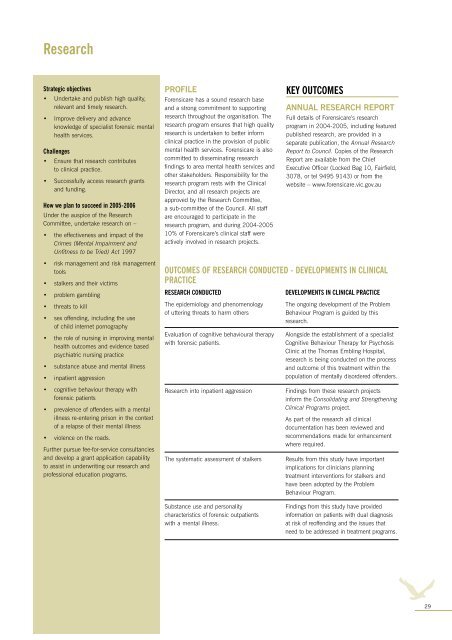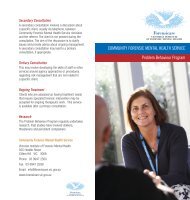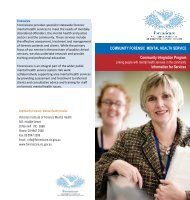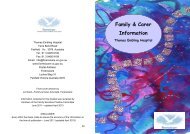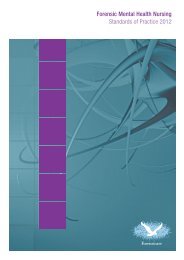Annual Report 2004-2005 - Forensicare
Annual Report 2004-2005 - Forensicare
Annual Report 2004-2005 - Forensicare
Create successful ePaper yourself
Turn your PDF publications into a flip-book with our unique Google optimized e-Paper software.
Research<br />
Strategic objectives<br />
• Undertake and publish high quality,<br />
relevant and timely research.<br />
• Improve delivery and advance<br />
knowledge of specialist forensic mental<br />
health services.<br />
Challenges<br />
• Ensure that research contributes<br />
to clinical practice.<br />
• Successfully access research grants<br />
and funding.<br />
How we plan to succeed in <strong>2005</strong>-2006<br />
Under the auspice of the Research<br />
Committee, undertake research on –<br />
• the effectiveness and impact of the<br />
Crimes (Mental Impairment and<br />
Unfitness to be Tried) Act 1997<br />
PROFILE<br />
<strong>Forensicare</strong> has a sound research base<br />
and a strong commitment to supporting<br />
research throughout the organisation. The<br />
research program ensures that high quality<br />
research is undertaken to better inform<br />
clinical practice in the provision of public<br />
mental health services. <strong>Forensicare</strong> is also<br />
committed to disseminating research<br />
findings to area mental health services and<br />
other stakeholders. Responsibility for the<br />
research program rests with the Clinical<br />
Director, and all research projects are<br />
approved by the Research Committee,<br />
a sub-committee of the Council. All staff<br />
are encouraged to participate in the<br />
research program, and during <strong>2004</strong>-<strong>2005</strong><br />
10% of <strong>Forensicare</strong>’s clinical staff were<br />
actively involved in research projects.<br />
KEY OUTCOMES<br />
ANNUAL RESEARCH REPORT<br />
Full details of <strong>Forensicare</strong>’s research<br />
program in <strong>2004</strong>-<strong>2005</strong>, including featured<br />
published research, are provided in a<br />
separate publication, the <strong>Annual</strong> Research<br />
<strong>Report</strong> to Council. Copies of the Research<br />
<strong>Report</strong> are available from the Chief<br />
Executive Officer (Locked Bag 10, Fairfield,<br />
3078, or tel 9495 9143) or from the<br />
website – www.forensicare.vic.gov.au<br />
• risk management and risk management<br />
tools<br />
• stalkers and their victims<br />
• problem gambling<br />
• threats to kill<br />
• sex offending, including the use<br />
of child internet pornography<br />
• the role of nursing in improving mental<br />
health outcomes and evidence based<br />
psychiatric nursing practice<br />
• substance abuse and mental illness<br />
• inpatient aggression<br />
OUTCOMES OF RESEARCH CONDUCTED - DEVELOPMENTS IN CLINICAL<br />
PRACTICE<br />
RESEARCH CONDUCTED<br />
The epidemiology and phenomenology<br />
of uttering threats to harm others<br />
Evaluation of cognitive behavioural therapy<br />
with forensic patients.<br />
DEVELOPMENTS IN CLINICAL PRACTICE<br />
The ongoing development of the Problem<br />
Behaviour Program is guided by this<br />
research.<br />
Alongside the establishment of a specialist<br />
Cognitive Behaviour Therapy for Psychosis<br />
Clinic at the Thomas Embling Hospital,<br />
research is being conducted on the process<br />
and outcome of this treatment within the<br />
population of mentally disordered offenders.<br />
• cognitive behaviour therapy with<br />
forensic patients<br />
• prevalence of offenders with a mental<br />
illness re-entering prison in the context<br />
of a relapse of their mental illness<br />
• violence on the roads.<br />
Further pursue fee-for-service consultancies<br />
and develop a grant application capability<br />
to assist in underwriting our research and<br />
professional education programs.<br />
Research into inpatient aggression<br />
The systematic assessment of stalkers<br />
Substance use and personality<br />
characteristics of forensic outpatients<br />
with a mental illness.<br />
Findings from these research projects<br />
inform the Consolidating and Strengthening<br />
Clinical Programs project.<br />
As part of the research all clinical<br />
documentation has been reviewed and<br />
recommendations made for enhancement<br />
where required.<br />
Results from this study have important<br />
implications for clinicians planning<br />
treatment interventions for stalkers and<br />
have been adopted by the Problem<br />
Behaviour Program.<br />
Findings from this study have provided<br />
information on patients with dual diagnosis<br />
at risk of reoffending and the issues that<br />
need to be addressed in treatment programs.<br />
29


